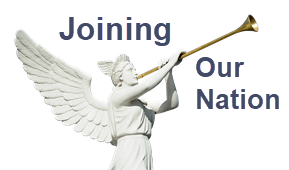About Joining Our Nation
Have we lost our collective vision, as Americans? If so, how do we come together to choose—democratically—what will be the “mission” guiding our people today, and our children and their children, tomorrow? How may we set aside petty differences in favor of collaborative stewardship regarding all things public? In sum, how may we realign democratically, toward choosing self-interest “rightly understood,” rather than self-interest linked to acts guided mainly by selfishness and self-righteousness?
Joining Our Nation is a narrative set in an almost magical period undergirding the building of the American West. At Joining Our Nation, our story begins with arrival of Mormon pioneers in the Salt Lake Valley in 1847, then continues through the joining together of America’s transcontinental rail system in 1869, at a place called Promontory, near Ogden, Utah, my childhood home.
Now, this same magnificent region that brought our nation so much hopefulness, is under siege due to egoistic claims—challenging government stewardship of public lands—fueled by antagonistic fervor. It’s the same sort of selfish, antagonistic fervor on display January 6, 2021, at the storming of our Nation’s capitol building.
Ultimately, Joining Our Nation becomes a hopeful narrative animating renewal of the American Spirit. Cultural renewal, however, must begin with a fundamental distinction. It underlies the critical difference between when we know, and when we merely believe we know, in our families and communities, and in public realms including politics and religion, embracing conspiracy theories also.
Ours is a narrative about the crucial need to observe the sacredness of America’s public lands and public spaces including old fashioned town hall meetings and on-line Internet dialogues. It’s a clarion call for respectful speaking with all who occupy America’s public spaces. Indeed, it’s a call for the sort of respect that begins with humility, which quite possibly becomes the “coin of the realm” in “re-gluing” America together. Surely without such glue, how else shall “we the people” be made whole, again?
Perhaps humility can pull the best of who we are—and the least of what we have become—back from the brink of pseudo-realities and haughty self-righteousness, and away from certitude that one’s resolve about how the world ought to work, is the only true and proper path.
